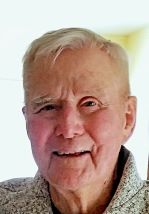
George Conner Martin
Professor of Plant Sciences, Emeritus
Family, friends, students, and colleagues are mourning the loss of George C. Martin, Professor Emeritus of Plant Sciences (formerly Department of Pomology). George passed peacefully at his home in McKinleyville, CA, on July 13, 2023, surrounded by his daughter Pam and his dear wife of 70 years, Patty. As a professor, he accomplished much and provided a warming sense of mentorship to all, with many colleague and student relationships that blossomed into lifelong friendships.
George Martin was born in San Francisco, CA (09/15/1933) and attended school in Oakland and the Salinas Valley. He graduated from King City High School in 1951, where he was class president. He earned his Bachelor of Science in Vegetable Crops at California State Polytechnic College in 1955 and was vice-president of his class. After earning his B.S., George served in the Marine Corps and was stationed in the North San Francisco and Santa Barbara areas. George rarely spoke of his time in the military but had recalled being only 3,000 yards away from the testing site of two atomic bomb tests in Nevada, with only a 6-foot-deep trench as protection. As a Marine veteran, his life epitomized the leadership traits of those who serve: Bearing, Courage, Decisiveness, Dependability, Endurance, Enthusiasm, Initiative, Integrity, Judgment, Justice, Knowledge, Loyalty, Tact, and Unselfishness. After fulfilling his military duties, he continued his academic career at Purdue University, earning an M.S. in Horticulture (1960) and Ph.D. in Plant Physiology (1962).
Following graduation, George began a long and productive career in pomology by taking a position as Research Plant Physiologist at the USDA Fruit Laboratory in Wenatchee, Washington. In July 1967, George joined the Department of Pomology at the University of California, Davis. He began his UCD career by co-teaching General Pomology (POM 10) with Kay Ryugo. Believing that UC Davis needed to train students to understand and solve critical issues, during summers, he arranged tours of California fruit and nut industries with his graduate students to better understand practical research needs and hone their skills for developing hypotheses and designing successful experiments.
George’s research focused on compounds for regulating plant growth (PGRs). He had a special interest in using PGRs to reduce the manual labor required for controlling fruit number to manage crop loads and promoting fruit abscission for mechanical harvest. He developed long-term collaborations with scientists in Israel, Italy, and the United Kingdom working on hormonal control of fruit abscission. George also took full advantage of his sabbatical leave opportunities, traveling to the UK (Aberystwyth University, Wales) in 1981 to study the role of the plant hormones gibberellic and abscisic acids on fruit growth and to Oregon State University (Corvallis) to improve techniques for identification of plant hormones. The skills acquired while on sabbatical were applied in his laboratory, leading to a better understanding of fruit and leaf abscission processes, and the improvement of techniques to apply that knowledge in the field.
George published over 130 peer reviewed articles and was a member of several professional organizations, including the American Society for Horticultural Science (ASHS, 1962-2023), International Society for Horticultural Science (ISHS), American Society of Plant Physiologists (ASPP), and Plant Growth Regulation Society of America (PGRSA). In his primary professional society of ASHS, he was elected as a Fellow (1977) and President (1989-90), and received numerous ASHS Awards, including Outstanding Researcher 1987), Outstanding Fruit Publication (1992), Membership Promotion (1977, 1982, 1984), Wilson Popenoe Excellence in Research (1982), the Stark Award (1980), and Joseph Harvey Gourley Award in Pomology (1971). In global horticultural science, the ISHS acknowledged George as a leading world expert. His cheerful and welcoming personality drew many international visitors to UC-Davis to work in pomology, stimulating new research, insights, and applications for the California fruit and nut sector. Within California, George also started and led the first ANR commodity working group, for walnuts and plant growth regulators. Anyone working with walnuts can use this group to discuss issues and submit research ideas, a model that is still used today and has been utilized to create working groups in other essential commodities.
From early in life, George was a committed athlete and demonstrated natural leadership through his involvement in extracurricular activities. Besides high school class president, he was a member of the track team and captain of the football team. He was active in Blue Key Sigma Xi, YMCA Board of Directors and Camp Chairman, Washington State Archery Association Board of Trustees, and President of the Wenatchee Archery Club. In Davis, he was well-known in the running and cycling communities, where he taught Sport Physiology, briefly coached the UC Davis Track team, and initiated a weekly running group that welcomed runners of all abilities. George’s colleagues in Wickson Hall could set their watches by his punctuality to leave five minutes before noon for his daily run.
George retired in 1995 and moved to Paradise, California, until the deadliest fire in California history destroyed his home, his beloved library, and his extensive collection of personal essays he’d written over the years to ponder the great philosophical questions of life. Following this, George and Patty moved to McKinleyville, in Humboldt County.
If George had been asked about his greatest accomplishments, he would likely have cited his role in educating leaders and developing lifelong friendships with them. He maintained many relationships with scientists worldwide and mentored many graduate students (his own and others) whom he taught to face adversity, be resilient, and enjoy life. George Martin was a gracious yet demanding role model who exhibited rectitude, generosity of spirit, meticulous habits, and zealousness in living his ideals.
Carlos Crisosto
Gary Stutte
Steven Weinbaum
